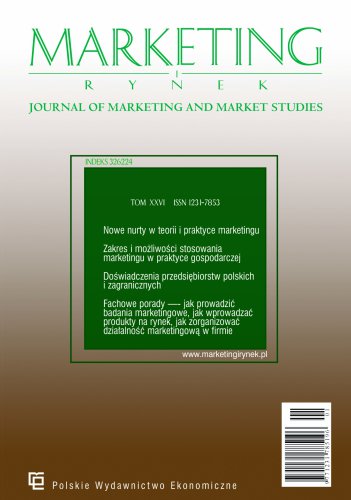Place of marketing innovations in the organization's development policy
One of the basic features of modern industrial and service organizations is the ability to systematically create and implement innovations with the active participation of clients in these processes. It is therefore reasonable to base the organization management policy on the client's perspective. It enables both the acquisition of value and its co-creation with the active participation of clients and the systematic use of their knowledge and experience through interactions occurring many times at any place and time. In business practice, the majority of organizations operating in Poland are managed from perspective of an organization, which leads to relatively low innovativeness of business entities. Therefore, the article attempts to assess the level of innovativeness of industrial and service organizations through the prism of the basic measure, which is the share of innovative organizations in their total number. In particular, an attempt was made to answer the following questions: 1) are Polish industrial and service organizations innovative? 2) what is the structure of implemented innovations? 3) what is the dynamics of implemented innovations? 4) are marketing innovations reflected in the organization's development policy? 5) what is structure of marketing innovations? The purpose of the publication is also to check the research thesis that the commonness of implementing marketing innovations is relatively low and diversified in industrial and service organizations. It depends mainly on the size of economic organizations and types of innovations. The implemented innovations are rather the result of thinking from the perspective of the organization rather than thinking from the perspective of the clients.
References
Bibliografia/References
Baruk, J. (2018a). Problemy komercjalizacji innowacyjnych towarów i usług w przedsiębiorstwach funkcjonujących w Unii Europejskiej. Marketing i Rynek, (1).
Baruk, J. (2018b). Wybrane aspekty innowacyjności przedsiębiorstw funkcjonujących w UE. Kwartalnik Nauk o Przedsiębiorstwie, 46(1).
Baruk, J. (2018c). Innowacyjność przedsiębiorstw funkcjonujących w państwach członkowskich Unii Europejskiej. W: J. Pyka i R. Wolniak (red.), Organizacja i Zarządzanie. Nowoczesność przemysłu i usług. Zeszyt 118. Gliwice: Wydawnictwo Politechniki Śląskiej.
Baruk, J. (2018d). Knowledge and Innovations as Factors of Organizational Development — an Integrated Approach. Marketing of Scientific and Research Organizations, 29(3).
Bibi, A. i Jadoon, B. (2018). The Mediating Effect of Exploitative and Explorative Learning on the Relationship Between Job Embeddedness and Innovative Work Behavior. Science Journal of Business and Management, 6(1). https://doi.org/10.11648/j.sjbm.20180601.11
Das, P., Verburg, R., Verbraeck, A. i Bonebakker, L. (2018). Barriers to innovation within large financial services firms. European Journal of Innovation Managment, 21(1). https://doi.org/10.1108/EJIM-03-2017-0028
Fallatah, M. I. (2019). Knowledge Workers Mobility in Innovative Organizations: The Role of Individual Differences. International Journal of Business and Management, 14(9). https://doi.org/10.5539/ijbm.v14n9p23
Ferraresi, A. A., Quandt, C. O., Santos, S. A. i Frega, J. R. (2012). Knowledge management and strategic orientation: leveraging innovativeness and performance. Journal of Knowledgr Management, 16(5). https://doi.org/10.1108/13673271211262754
Główny Urząd Statystyczny (2012). Działalność innowacyjna przedsiębiorstw w latach 2009–2011. Warszawa: Główny Urząd Statystyczny.
Główny Urząd Statystyczny (2015). Działalność innowacyjna przedsiębiorstw w latach 2012–2014. Warszawa: Główny Urząd Statystyczny.
Główny Urząd Statystyczny (2018). Działalność innowacyjna przedsiębiorstw w latach 2015–2017. Warszawa, Szczecin: Główny Urząd Statystyczny.
Griffin, R. W. (2007). Podstawy zarządzania organizacjami. Warszawa: Wydawnictwo Naukowe PWN.
Janssen, W. i Bouwman, H. (2014). An organizational competence model for innovation intermediaries. European Journal of Innovation Management, 17(1). https://doi.org/10.1108/EJIM-09-2012-0087
Lee, Ch. i Hidayat, N. (2018). The Influence of Knowledge Sharing on Service Innovation Performance: An Empirical Study on Hotel in North Borneo, Indonesia. Euroasian Journal of Business and Management, 6(2).
Ministerstwo Nauki i Szkolnictwa Wyższego (2008). Podręcznik Oslo. Zasady gromadzenia i interpretacji danych dotyczących innowacji. Warszawa: Ministerstwo Nauki i Szkolnictwa Wyższego.
Nonaka, I. i Takeuchi, H. (2000). Kreowanie wiedzy w organizacji. Warszawa: Poltext.
Peters, Th. J. i Waterman, R. H. (2000). Poszukiwanie doskonałości w biznesie. Warszawa: Wydawnictwo MEDIUM.
Prahalad, C. K. i Ramaswamy, V. (2005). Przyszłość konkurencji. Współtworzenie wyjątkowej wartości wraz z klientami. Warszawa: Polskie Wydawnictwo Ekonomiczne.
Prahalad, C. K. i Krishnan, M. S. (2010). Nowa era innowacji. Warszawa: Wydawnictwa Profesjonalne PWN.
Ri, K., Wang, Y. i Zhang, X. (2018). Innovator's Innovative Genetic Model: From Biological to Social Perspective. Science Journal of Business and Management, 6(2). https://doi.org/10.11648/j.sjbm.20180602.12

